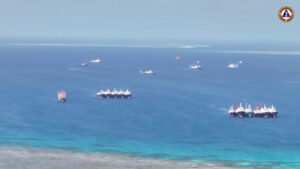
Philippine security council seeks funds to boost South China Sea presence
THE PHILIPPINES needs more funds to boost its defense capacity in the South China Sea, the National Security Council (NSC) told a House of Representatives committee on Wednesday amid the increasing presence of Chinese militia ships at Whitsun Reef.
“A big way forward actually is developing [our] capacity so that we develop a credible defense posture and our support to the government in the area,” NSC Assistant Director-General Francis Jude S. Lauchengco told the House special committee on the West Philippine Sea.
The committee asked the military to submit a “written concrete proposal” on the funding needed by the task force.
About 111 Chinese militia vessels were spotted at Whitsun Reef, which the Philippines calls Julian Felipe Reef, last month, according to Coast Guard spokesman Jay Tarriela.
The number of Chinese ships increased to 135 at the weekend, the Philippine Coast Guard (PCG) said on Dec. 3.
Whitsun Reef is about 175 nautical miles (324 kilometers) west of Bataraza town on the island of Palawan. It is the largest reef among the Union Banks in the Spratly Islands, which the Philippines claims.
Deputy Minority Leader and Party-list Rep. France L. Castro said that Philippine vessels were delayed in reacting to the presence of Chinese ships in the area.
“It took a month before we reacted,” she said in Filipino. “Whether there are Chinese vessels there or not, let us be proactive, not reactive.”
China claims more than 80% of the South China Sea based on a 1940s map, which a United Nations-backed arbitration court voided in 2016.
The Philippines has been unable to enforce the ruling and has since filed hundreds of protests over what it calls encroachment and harassment by China’s coast guard and its vast fishing fleet.
Girard Mariano L. Lopez, a Filipino member of the Asian pro-democracy group Milk Tea Alliance, said Philippine strategies in handling disputes with China are ineffective.
“We have been very firm in our stance that the government has never actually done enough,” he told BusinessWorld in an interview in Taipei last week.
The Philippines has filed 129 diplomatic protests against China from July 2022 to Nov. 28. Sixty-two of these were filed this year, according to Foreign Affairs spokesperson Ma. Teresita C. Daza.
“Aside from just words and statements, it’s time that the Philippines actually invest, perhaps, some of their confidential funds and misplaced resources into things that actually matter,” said Mr. Lopez, who is a humanities student at the National Chengchi University in Taipei.
Vice-President and Education Secretary Sara Duterte-Carpio in October said people who oppose confidential funds oppose peace. “Whoever opposes peace is an enemy of the nation,” she added.
“Such resources would be better used to fortify our defenses of our seas, of our beautiful environment and corals within the West Philippine Sea, and helping our fisherfolk not get harassed everyday by the Chinese Coast Guard,” Mr. Lopez said, referring to areas of the South China Sea within the country’s exclusive economic zone.
He said there have been calls to “expel the Chinese ambassador in Manila for his heinous remarks indirectly threatening the 150,000 overseas Filipino workers in Taiwan. That was actually a very hot issue among Filipinos here.”
Chinese Ambassador to Manila Huang Xilian in April asked Manila to oppose Taiwan’s independence if the country “cares genuinely” about the OFWs living there. — Beatriz Marie D. Cruz



